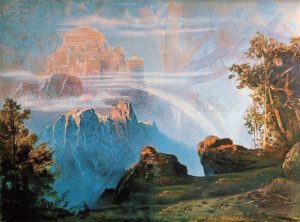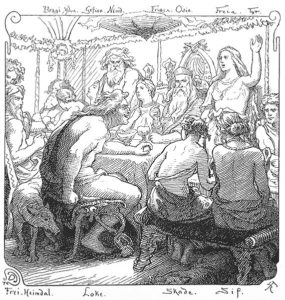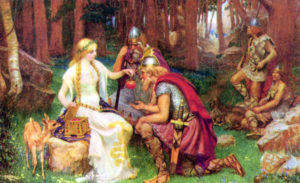Valhalla
Higher than the loftiest peaks of the mountains, higher than the ashen clouds whirled by the wind from the lofty summits, stretched the luminous abode of the immortal gods.

Lord of the place and prince of the gods was the wise and powerful Wotan. His gaze encompassed the whole panorama of the world. He perceived everything that was happening in the most hidden valleys of the earth and the great depths of the sea. The whole expanse was like an open book to him: snowy fields and cultivated meadows; dense jungles and desolate plains; deserted fields and tumultuous cities.
On Wotan’s shoulders perched two swift-flying ravens. Daily they would travel over the most diverse regions and return to inform the lord of Valhalla of all that was happening in the kingdom of men.
Wotan himself sometimes descended and discoursed among mortals. He would leave his golden helmet and his heavy spear and disguise himself as a poor wandering pilgrim. Instead of his mighty spear, he would then wield an ash-tree shaft, on which were inscribed the pacts he made, with men and gods, and which he bound others and bound himself to fulfil.
The lord of Valhalla returned to his abode satisfied with the course of events in the world, and there he spent his time in the company of his wife Fricka and her sister Freia.
Wotan’s daughters were the nine Valkyries, gallant Amazons, invincible in war. Invisible to the eyes of men, they were only glimpsed by them at the last hour of life. Armed and protected with helmets and breastplate, they mingled in the turmoil of earth’s battles, and carried on their lithe horses the bodies of heroes who had fallen in the heat of battle. They carried them to the abode of the gods, and there, in Valhalla, they were reborn to eternal life as a reward for their heroism.
Wotan’s palace was worthy of such a god. It had been built by two skilful builders, the giants Fafner and Fasolt. In payment for the enormous and heavy task, the lord of Valhalla had promised them a worthy reward.
When the work was done, the builders were questioned.
-What is the reward you expect?
The two giants, without a moment’s hesitation, gave the long-prepared answer:
-We want you to give us Freia, the sister of your wife Fricka.
-How dare you ask me for anything less than Freia, the goddess of youth? She is the only one who knows how to cultivate the fruits that grant the gods eternal youth.
-You have promised, Wotan; you cannot refuse. The pact is engraved on your ash shaft.
The Norse gods were mortal, and only through the apples
of Iðunn could they hope to live until Ragnarök.
Image by J. Penrose, 1890.
Indeed, Wotan was bound by the covenant inscribed on his staff. What to do?
At that moment Loge was seen coming. The mischievous fire-god approached cautiously and whispered in the ear of the lord of Valhalla:
-Promise to deliver Freia promptly. I will find a way to outwit these clumsy giants.
Some time passed. Wotan’s palace shone in Valhalla and commanded the admiration of all the gods. It was an abode worthy of the prince of the immortal gods.
One day he saw Freia rushing towards him.
-What is the matter with you, goddess of youth?
-Fafner and Fasolt are after me. They say I belong to them.
Wotan was about to reply when the two giants arrived, choked by their running.
-It has been a long time since your promise was made, and it has not yet been kept. We want Freia. She belongs to us, and you can no longer keep her by your side.
Between the two giants they embraced the young goddess, and at that moment Wotan and the other gods felt their youthful strength diminish. Without Freia the life of the immortals was worthless.
Freyja and Loki flyte in a 1895
illustration by Lorenz Frølich.
Wotan’s astute counsellor came in time.
-Here comes Loge; he will advise what to do! -said Votán, and, turning to the newcomer, he continued:
-You are late, god of fire. Valhalla is almost without Freia, and we are without youth.
In a firm voice and tone Loge replied:
-Freia cannot leave Valhalla. Our eternal youth would dissipate like mist dissolved by the sun’s rays. In exchange for Freia, Fafner and Fasolt can be rewarded with gifts more important to them. I have travelled the entire surface of the earth and visited the bottom of the seas and the subterranean dens. I was going to return saddened because I had found nothing worthy to offer these giants in exchange for Freia. But just as I was about to return, I was given great news. Alberich, of the Nibelung race, has renounced love and has been able to steal the gold of the Rhine. With it he has forged a ring. With the power it gives him, he dominates all of his race. In his underground caverns he forces them to amass vast treasures for him. Crowds of dwarves mine precious metals and stones from the bowels of the earth. But what the Nibelung is most proud of is that with the golden ring of the Rhine his power will obscure that of the gods of Valhalla. If we can wrest this ring from Alberich, we can give Fafner and Fasolt all that treasure instead of giving them Freia.
-What do you say, Fafner? -Wotan asked one of the giants.
-For me… I accept. I don’t know what my companion thinks.
-And you, Fasolt?
Once the giants had nodded, Wotan and Loge set off towards the Nibelungenreich in search of their treasures.

One reply on “The Ring of the Nibelung, 2”
The old Aryan religion was beautiful; only Judeo-Christianity, with its idea of eternal damnation, introduced spiritual terror into the West (cf. the Führer’s after-dinner talks with his closest friends).